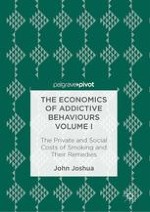2017 | OriginalPaper | Buchkapitel
7. Economic Remedies to Reduce Smoking
verfasst von : John Joshua
Erschienen in: The Economics of Addictive Behaviours Volume I
Aktivieren Sie unsere intelligente Suche, um passende Fachinhalte oder Patente zu finden.
Wählen Sie Textabschnitte aus um mit Künstlicher Intelligenz passenden Patente zu finden. powered by
Markieren Sie Textabschnitte, um KI-gestützt weitere passende Inhalte zu finden. powered by
